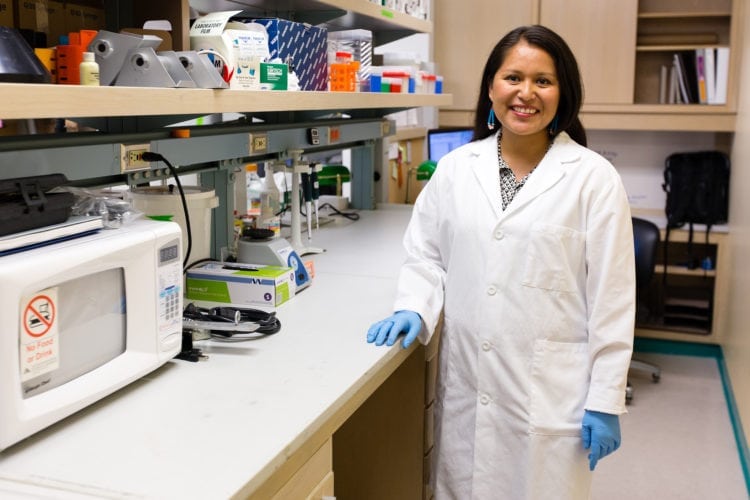
As a Navajo scientist trained in genomics, UWSOP post doctoral researcher Katrina Claw is on a two-fold mission to make a difference: As a scientist, she seeks to understand the role genetics play in Vitamin D insufficiency in Alaskan Native populations.
“I am like a bridge. I connect Native knowledge and Western science, but I am also walked over. It can be hard to connect the multiple cultures and ways of knowing, but I am sure this is the best path forward.”–Katrina Claw, Post Doc, Pharmaceutics
As a Native American, she wants to increase the number and impact of indigenous people pursuing science as a career. “It’s not enough just to get admitted to a program or school,” she says. “There are significant burdens on underrepresented students. We need mentors who can provide support, and guide us through the system, particularly to find funding. I was fortunate to find faculty mentors like Drs. Wylie Burke and Kenneth Thummel who believed in me.”
Katrina also found support in organizations like the Society for Advancement of Chicanos/Hispanics and Native Americans in Science (SACNAS). “When high school students meet me, they realize they can pursue science as a career and I want to encourage them in that work.”

Her life experiences inform her research. Working with tribal partners in the Northwest-Alaska Pharmacogenetic Research Network (NWA-PGRN), Katrina’s NIH fellowship research seeks to identify and functionally characterize variation in genes related to vitamin D metabolism. Vitamin D deficiency is a public health problem, particularly for northern latitude indigenous populations. Limited sunlight exposure and a shift to Western diets may be some of the driving causes of insufficiency, but gene variation modifies individual risk.
With all that’s known, there remains inter-individual variability that is not completely understood. As more Alaskan Native people suffer from vitamin D insufficiency, there may be increases in pathologies like cancer, heart disease, and bone disease. Knowledge of genomic variation associated with Vitamin D levels will be key to achieving optimal intervention strategies that reverse the insufficiency.
Another aspect of Katrina’s research is to actively engage with Native American partners, exploring their expectations for genomic medicine research. In the past, some Native communities lost trust in researchers who used tissue samples and data without permission.
“It needs to be a transparent, meaningful partnership. In particular for genomics, it is all about how you generate, store and share data,” said Katrina. “The core of UW’s NWA-PGRN mission is to form and deepen connections with the communities with whom they work.”
She wants to partner with more tribes in the future to help them benefit from health research. One possible outcome: a return to a more traditional diet that may improve Vitamin D levels and also support tribal efforts to keep traditions alive in the community.
“How we communicate findings is important. We have to go beyond academic papers and work with tribal leaders to inform the community.”
Advance your career in research or pharmacy at the University of Washington!
Click on the links for more information about our Graduate Programs in Medicinal Chemistry, Pharmaceutics, Pharmaceutical Outcomes Research and Policy, and Biomedical Regulatory Affairs.